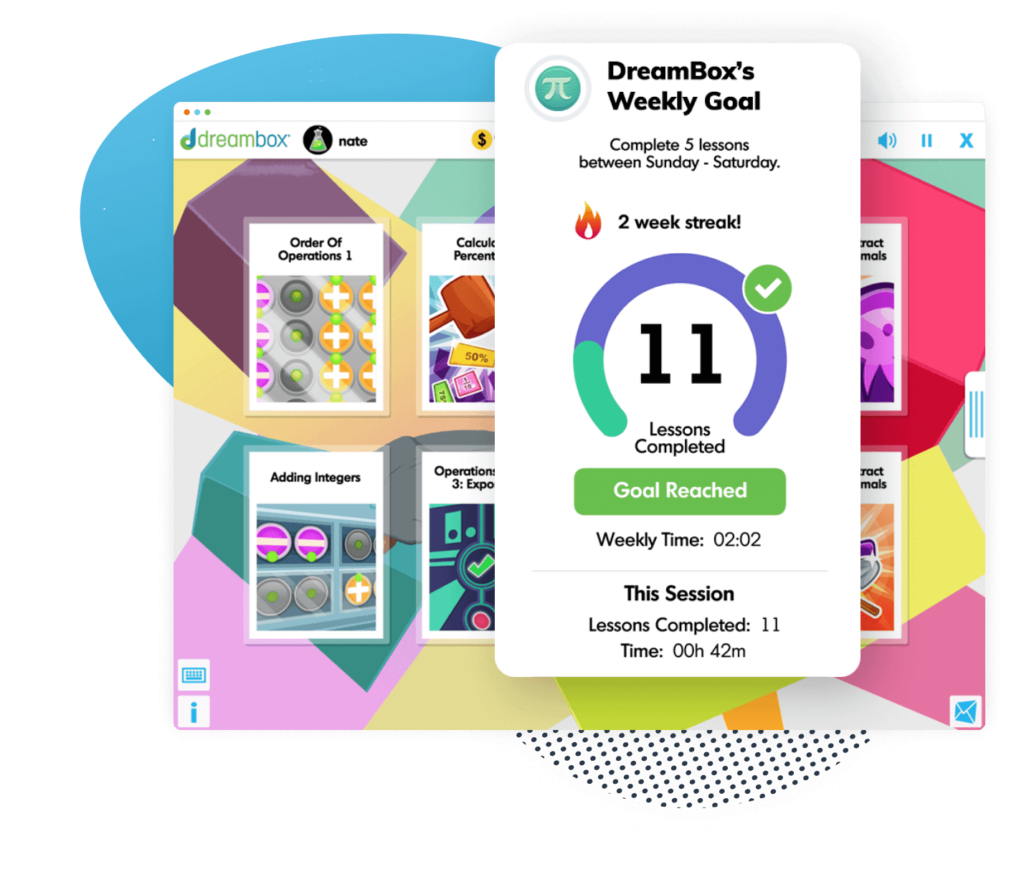Top Picks for the Best 7th Grade Homeschool Curriculum
The complete guide to homeschooling a 7th grader, from a veteran homeschool mom.

Author
Kristy Howard
Published:
April 2025
Key takeaways
- • Homeschooling 7th grade can feel a bit intimidating, as academic skills become more complex and students move into middle school.
- • Most often, the 7th grade homeschool curriculum focuses on building fluency in literature analysis, problem-solving, and exploring complex ideas in math, reading, and writing.
- • To confidently homeschool during the middle school years, know your options and set your student up for success with a sustainable schedule, curriculum, and community.
My youngest child is going into 7th grade this year, which makes this the fifth time for me to homeschool 7th grade. Although experience has calmed the initial anxiety I felt about homeschooling through middle school, there are still several aspects I’m particularly intentional about. Experience has also taught me that education is on an upward spiral at this point, and I’m well aware that every subject is not my expertise!
Whether you’re brand new to homeschooling or a seasoned home educator, chances are you’ve spent some time pondering (or even worrying about) what 7th grade homeschool might look like. Each school year is a new adventure, and homeschooling 7th grade is no exception. But here’s the thing you need to know: you are more than capable of homeschooling a 7th grader, and you have access to any information or resources you lack.
Today I’m sharing everything you need to know to prepare for 7th grade: from choosing a 7th grade homeschool curriculum to what subjects to teach and how many hours a day you need to block out for focused learning.
By the time you finish reading this article, I hope you’re feeling more confident and informed about how to homeschool 7th grade.
Let’s dive in!
What subjects are taught in the 7th grade?
The answer to this question will partly depend on what state you live in. A quick review of homeschool state laws will help you determine if your state has required subjects or not.
But generally speaking, 7th grade homeschool curriculum should include the following:
- Math
- Science
- Social Studies (including history, geography, civics, and world cultures)
- Language Arts (including reading, writing, grammar, and literature analysis)
- Art
- Health
Seventh grade homeschool schedule
The most important thing to realize as you prepare to homeschool 7th grade is that homeschooling doesn’t have to look exactly like private or public schooling. “Good” homeschooling will include a written curriculum (or online curriculum), some kind of structure or schedule, and lots of fun and time with friends and family.
To prep for 7th grade, make sure you have the following supplies on hand for yourself and your student:
- Home computer and printer
- Laptop for your child
- Digital or paper planner (for you)
- Mobile device (for your child)
- Library card
- 7th grade homeschool curriculum
- Backpack (for your child)
- Notebooks and folders
- Graph paper
- Basic school supplies
- Graphing or Scientific calculator (if taking advanced math)
To dive a little deeper into this topic, also read “How to Start Homeschooling: Everything Parents Need to Know.”
How to choose a 7th-grade homeschool curriculum
You have many wonderful options when it comes to choosing homeschool curriculum! In fact, I’ve heard many new homeschool moms express overwhelm at how many options there are.
Here are a two easy ways to narrow down your options (and overwhelm) when it comes to 7th grade homeschool options:
- Learn about learning styles (and try to figure out your child’s)
- Become familiar with the 8 common types of homeschooling methods (chances are you’ll relate to at least one or two)
I encourage you to give yourself permission to tailor your curriculum choices to your child’s academic strengths and personal interests. (This will make the school year much more enjoyable for both you and your student.)
Is your child really strong in math or science? Go with more advanced study in these subjects, and consider enrolling your 7th grader in a class that provides science labs or math competitions.
If your child is into sports or dance or theatre, focus on those activities by providing opportunities for them to join a team, participate in recitals, or go out for an audition. Around this age, kids are likely starting to “own” their interests and personal passions, and opportunities to learn skills and play or perform with teams can be a huge confidence booster.
Give yourself permission to think outside the textbook as you plan your 7th grader’s academic calendar and curriculum. A robust education is never limited to the covers of a book.
Table of contents
Get help with homeschool math with DreamBox!
What are the best 7th-grade homeschool curriculums?
7th grade Language Arts homeschool curriculum
I believe that language arts is one of the most important subjects you will teach in any grade. Why? Because language arts encompasses everything from reading and spelling to comprehension and writing–it’s the vital foundation for human reasoning, expression, and rhetoric.
Depending on your preferred homeschool style and method, you may enjoy any of the following as you teach language arts to your 7th grader:
- Reading aloud together (my kids are never tired of read aloud times!)
- Writing short stories
- Learning how to write essays and book reviews
- Diving deeper into comprehension skills
- Dictation
- Analyzing literature and poetry
- Trips to the library (7th grader is an ideal time to teach library navigation skills)
- Watching the movie after reading a book
A few highly recommended language arts options include:
- Institute of Excellence in Writing (IEW)
- Grammar Galaxy (Nova)
- Shurley English (Level 7)
- *All About Reading
- *All About Spelling
- Structure and Style for Students (Level B)
- *Mastering Cursive (the Good and the Beautiful, Level 7 workbook)
- Easy Peasy All-in-One Homeschool (Language Arts 7)
*Highly recommended for 7th graders with dyslexia, or who struggle with spelling and writing.
7th grade math homeschool curriculum
Math isn’t my strong suite, but that doesn’t mean I can’t provide a thorough education for my 7th grader! As homeschoolers, we have many amazing options for helping our kids master math skills.
Here are a few must-have math resources for 7th grade:
- Homeschool Math Practice
- 15 Math Tricks for Kids
- 10 Helpful Math Strategies
- How to Get Better at Mental Math
- Online Math Tutoring
Here are a few of the top-rated homeschool math curriculums for 7th grade:
- Understanding Pre-Algebra (The Critical Thinking Co)
- Principles of Mathematics, Level B (Master Books)
- Saxon Math (Level 8/7)
- Math-U-See (“Zeta” or Pre-Algebra Level)
- Dimensions Math Grade 7 Set (Singapore Math)
- Pre-Algebra 0 (Life of Fred)
- Math Mammoth 7
- Simply Good and Beautiful Math 7
For even more 7th grade math resources, also read: “What’s the Best Homeschool Math Curriculum?”
7th grade history homeschool curriculum
I think the most important thing to remember when teaching social studies to a 7th grader is not to reduce the learning to reading boring textbooks and memorizing a long list of facts. Make history come alive through storytelling and hands-on fun!
I encourage you to include a few of the following activities in your homeschool program for middle school social studies:
- Trips to museums
- Visits to historical sites
- Movies or shows about historical characters or events
- Reenactments (attending or participating)
- Beautiful maps around your home as wall art, place mats, etc.
- Songs and jingles to help memorize facts and dates
- Celebrating historical days
- Attending parades and other historical “holiday” events
Here are a few favorite resources for teaching 7th grade history, civics, and geography:
- The Story of the World (Volume 3)
- True Stories of War Graphic Novels (3 volume set)
- Uncle Sam and You (civics curriculum set)
- Mystery of History (volume 3)
- Beyond the Page (a literature-based program that covers science, social studies, language arts, and math)
- Beautiful Feet Books (a Charlotte Mason literature-based K – 12 curriculum)
- Easy Peasy All-in-One Homeschooling (complete history and geography curriculum)
I can’t over emphasize the importance of reading interesting, engaging history books with your student! And by “history books,” I don’t necessarily mean textbooks (although those have their place).
But there’s certainly nothing wrong with browsing your local library for chapter books–or even picture books and graphic novels–to explore historical characters, events, and places.
When it comes to writing assignments or projects about history, let your 7th grader choose the person or event they are most interested in. In teaching my own children and other students over the years, I consistently find that interest-led school assignments are much more successful, enjoyable, and effective.
Homeschool 7th grade science curriculum
Much like history, exploring science with your middle schooler should be exciting, hands-on, and anything but boring!
I’m not a “science” person, but I’ve still enjoyed discovering this subject with my kids. Here are some top recommended homeschool 7th grade science resources:
- Noeo Science (Level 3 is geared for 7th – 8th grades)
- Journey Homeschool Academy (Level B, video-based science courses)
- Easy Peasy All-in-One Homeschool (complete courses for 7th grade earth science, biology, zoology, and physics and chemistry)
- Beyond the Page (a literature-based program that covers science, social studies, language arts, and math)
- Beautiful Feet Books (a Charlotte Mason literature-based K – 12 curriculum)

The math program that drives results
Get started today!
DreamBox adapts to your child’s level and learning needs, ensuring they are appropriately challenged and get confidence-building wins.
FAQs
The best way to teach 7th grade at home is to to pick a curriculum that aligns with both your homeschool style and your child’s learning style; invest in a few basic school supplies; create a sustainable schedule for your homeschool program; be consistent with your chosen schooling time; stay connected with friend groups or a homeschool community; stay active and have lots of fun!
By 7th grade, a child should be starting to do some independent studying. Depending on learning style, personality, and skill master, independent study may include: ability to stick with a schedule or routine; independent reading; ability to compile facts and write a paper; test study skills.
However, don’t worry if your 7th grader still needs a little or even a lot of help staying on track! I’ve learned that one of the most important skills kids can learn as they head into middle school is to ask for help if they feel “stuck.” Make sure your child always knows they can come to you for assistance or support.
Depending on your state homeschool laws, a 7th grader will likely need to study core subjects like math, language arts, social studies, and science, along with electives like health and art.
In public and private school, a 7th grader will be in school for six to eight hours a day, four or five days a week. In some states, homeschoolers are required to closely mirror the public school schedule. (Again, it’s important to check your state homeschool laws for required learning days or hours per school year.)
If your state is more flexible on the required learning hours, a reasonable schedule for homeschooling a 7th grader will include about three to four hours of focused learning time per day, four to five days per week.
Many homeschool parents find it helpful to have their child spend about 45 minutes on each subject, depending on their attention span and mastery level. However, to preserve your own sanity keep this as a rule of thumb, not a rigid rule! The point is to engage with a lesson enough to master concepts over the long haul, so don’t worry if your child rushes through some lessons and needs lots of repetition with others.
State homeschool laws vary from no required days or hours, to fairly strict requirements, so make sure you check out your state homeschooling laws and learn about required hours or days of school per year.
The answer to this question depends on one thing: your budget.
You can homeschool for nearly free, or you can invest thousands of dollars into your child’s education. (Most homeschoolers land somewhere in the middle.)
Here is a breakdown of some of the potential larger expenses of homeschooling a 7th grader:
- Math curriculum–if you buy new, middle school math sets tend to run upwards of $70 – 100
- Science curriculum–especially if you opt into a curriculum with labs or a video course, you’re looking at $100 or more
- History curriculum–history books are easier to find used, but if you opt for new curriculum expect to spend $70 – $100
- Extracurriculars–depending on your child’s interests, expect to spend anywhere from a few hundred dollars to $1,000 or more on gear, equipment, lessons, etc.
- Co-op fees–many homeschool communities still have free options, but the more structured co-ops charge yearly fees which can cost anywhere from $60 to $100 per family to several hundred dollars per child
Take at home math practice to the next level
Empowering parents and educators to make math practice more impactful. Plus, your kids will love it.


About the Author
Kristy Howard
Kristy Howard is a Fort Worth-based writer, homeschooling mom, and lifelong introvert. When she’s not writing for clients, Kristy enjoys thrifting designer clothes, taking long walks in nature, and creating content for her lifestyle blog for introverted women.